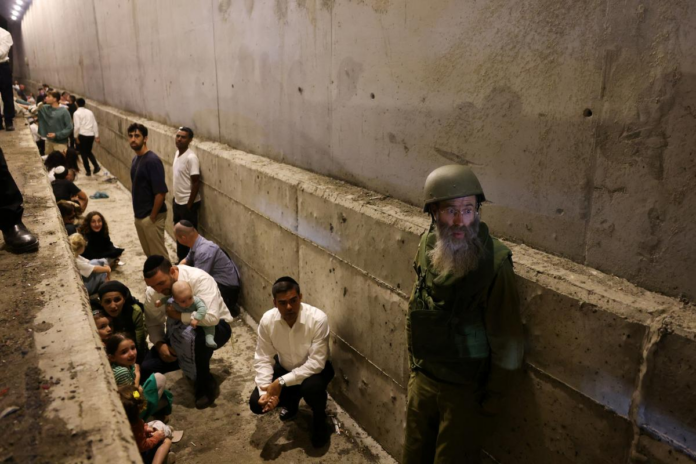The escalating Middle East conflict reached a boiling point on Tuesday, as Iran fired missiles at Israel, triggering alarms across the nation and sending civilians scrambling for safety. Explosions rocked Jerusalem and the Jordan River Valley, while Israelis rushed to bomb shelters, fearing for their lives in the face of increasing hostilities.
According to Reuters, even reporters on state television were forced to lie flat on the ground during live broadcasts as sirens wailed across the country. The situation marks a dangerous escalation in an already volatile region.

IDF Confirms Missile Strikes from Iran
Israel Defense Forces (IDF) spokesperson Rear Admiral Daniel Hagari confirmed the attack in an official statement, announcing that missiles had been launched from Iran targeting Israel.
“A short time ago, missiles were launched from Iran towards the State of Israel. You are asked to remain vigilant and follow the Home Front Command’s instructions precisely,” said Hagari, urging civilians to stay safe as the nation grapples with the sudden escalation.
The IDF promptly issued life-saving instructions through mobile phones, urging civilians to seek shelter. Protected spaces became the refuge for thousands of Israelis, as the IDF warned that air raid sirens would continue to sound, signaling further potential threats.
Explosions Rock Jerusalem and Jordan River Valley
Alarms weren’t the only source of fear in Israel—explosions echoed through Jerusalem and the Jordan River Valley, sending waves of panic throughout the population. The IDF has since assured the public that the nation’s air defense systems are fully operational and intercepting incoming threats, but added that the system is “not hermetic.” Israelis were reminded to continue following safety instructions as explosions might indicate either interceptions or missile impacts.

US Warns Iran: Severe Consequences
As tensions continue to rise, the United States has also weighed in, warning Iran of “severe consequences” should the missile attacks on Israel continue. According to an AP report, a senior White House official confirmed that U.S. ships and aircraft have been positioned in the region to assist Israel in the event of further aggression.
This comes after Israel’s Prime Minister Benjamin Netanyahu made a stern warning to Iran, declaring, “There is nowhere in the Middle East Israel cannot reach.”
Escalation After Ground Raids into Lebanon
The latest missile strikes from Iran come on the heels of Israeli ground raids into Lebanon, which were described as limited but seen as a significant move in the broader conflict. Israel’s operations in Lebanon have sparked further tensions with Hezbollah, a powerful militant group backed by Iran, creating a regional powder keg that now seems to be igniting with every passing hour.
Past Attacks and Current Scenario
This is not the first time Iran has attempted to target Israel directly. In April, Iran launched a missile strike against Israel, but many of its projectiles were intercepted by a U.S.-led coalition, while others failed at launch. However, the current situation suggests a wider conflict that may drag in multiple regional players, with the potential to erupt into full-scale warfare.
Conclusion: Israel on High Alert Amid Missile Strikes
As missile strikes continue and explosions rock parts of the country, Israel is on high alert. The nation’s air defense systems are fully operational, but the threat level remains high as the conflict with Iran intensifies. Civilians are bracing for what could be an extended period of uncertainty, with many fearing that the worst is yet to come.
As the Iran-Israel conflict deepens, the world watches closely, hoping for a diplomatic resolution, but preparing for further escalation.

